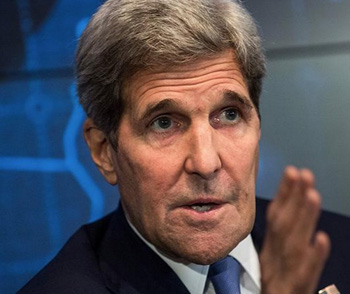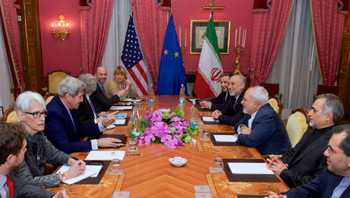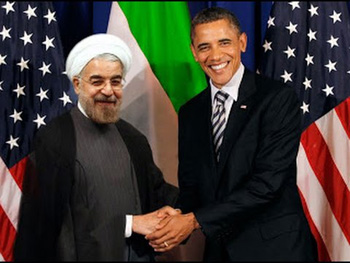International Affairs
 |
 |
 |
 |
 |
 |
 |
Kerry & the Obama’s Capitulation to Iran
Beginning in 2011, President Obama secretly enticed the Iranian regime to the bargaining table by communicating that he was open to abandoning longstanding American opposition to Iran’s claimed “right” to enrich uranium. This news comes to us from a new MEMRI report, which elaborates that Obama relied on then-senator John Kerry to grease the wheels for his entreaty to Iran’s leader.
 Why Kerry?
Why Kerry?
Though he was surely a key Obama ally on Capitol Hill, Kerry was not in the administration. The president already had a compliant Secretary of State, Hillary Clinton, who was dutifully implementing his appeasement policies. He also had any number of subordinate administration officials capable of passing messages. So why would Obama choose Kerry as his emissary to alert Iran to a dramatic shift in American policy?
Clearly, there are two reasons: Obama needed someone outside the administration, and Kerry’s status and track record made him a natural.
Remember, Obama was running for reelection in 2011-12. Public opposition to Iran’s acquisition of nuclear weapons and, therefore, to Iran’s enrichment of uranium was very strong – and, indeed, remains so. Consequently, Obama pretended on the campaign trail that he would vigorously oppose Iran’s uranium-enrichment efforts... even as he was covertly signaling to the jihadist regime that he was open to recognizing Iran as a nuclear power.
As my friend Fred Fleitz of the Center for Security Policy has noted, Obama asserted in the lead-up to the 2008 election that “the world must work to stop Iran’s uranium-enrichment program.” So too, in the run-up to the 2012 election, did Obama continue assuring voters that Iran “needs to give up its nuclear program and abide by the U.N. resolutions that have been in place.”
Those U.N. resolutions prohibit Iran’s enrichment activities. Thus did the president proclaim, in seeking reelection, that the only deal he would accept would be one in which the Iranians “end their nuclear program. It’s very straightforward.”
With Obama out feigning opposition to Iran’s enrichment activities, it would not do to have a conflicting message communicated to Iran by his own administration. What if Iran, to embarrass Obama, were to go public about an administration entreaty that directly addressed enrichment? It would have been hugely problematic for the president’s campaign. Obama thus needed an alternative: someone outside the administration whom Obama could trust but disavow if anything went wrong; someone the Iranian regime would regard as authoritative.
John Kerry was the perfect choice.
Besides being the Democrats’ 2004 presidential nominee, Kerry was then chairman of the Senate Foreign Relations Committee and a reliable Obama ally on foreign-policy issues. Kerry frequently spoke out on U.S. relations with Iran and would be seen by the regime in Tehran as a credible barometer for reading Obama. It was no secret, moreover, that Kerry had designs on replacing Mrs. Clinton as Secretary of State in a second Obama term.
Just as significantly, Kerry’s belief that the United States should capitulate to Iran on the “right to enrichment” was well known to the Iranians.
 Some background: As I outlined in my column, the Nuclear Non-proliferation Treaty (NNP) holds that every nation has an “inalienable right” to use nuclear power peacefully. Yet the treaty does not confer an explicit right to obtain nuclear power through any particular route, let alone a route like uranium enrichment – a process that can easily be diverted to the weaponization of nuclear power, the thing the NNP treaty is designed to prevent. For this reason, it has been American policy under administrations of both parties that the right to peaceful nuclear power does not imply a right to enrich uranium.
Some background: As I outlined in my column, the Nuclear Non-proliferation Treaty (NNP) holds that every nation has an “inalienable right” to use nuclear power peacefully. Yet the treaty does not confer an explicit right to obtain nuclear power through any particular route, let alone a route like uranium enrichment – a process that can easily be diverted to the weaponization of nuclear power, the thing the NNP treaty is designed to prevent. For this reason, it has been American policy under administrations of both parties that the right to peaceful nuclear power does not imply a right to enrich uranium.
But Kerry was known to scoff at this policy.
Fred Fleitz has usefully directed my attention to an enlightening 2009 Financial Times interview during which Senator Kerry opined that it was “ridiculous” to argue against Iran’s right to enrich uranium. The interview occurred in June, during the first round of the infamous Iranian presidential election that the Khamenei regime eventually stole for Ahmadinejad, igniting a popular revolt that the regime violently put down while Obama looked the other way.
The Financial Times reported:
One of the most senior Democrats in Washington has dismissed a key element in the west’s long standing strategy on Iran’s nuclear programme as “ridiculous.” His comments throw open the debate about how far the US and its partners should go in seeking a compromise with Tehran after on [sic] Friday’s presidential election.
John Kerry, chairman of the Senate foreign relations committee and the Democrats’ 2004 presidential nominee, told the Financial Times in an interview that Iran had a right to enrich uranium – a process that can produce both nuclear fuel and weapons grade material. ...
“The Bush administration [argument of] no enrichment was ridiculous ... because it seemed so unreasonable to people,” said Mr. Kerry, citing Iran’s rights as a signatory of the nuclear non-proliferation treaty. “It was bombastic diplomacy. It wasted energy. It sort of hardened the lines, if you will,” he added. “They have a right to peaceful nuclear power and to enrichment in that purpose.”
 And now we learn that two years later, when Obama wanted to assure Khamenei that he would be flexible on Iran’s demands (even as the president was telling Americans the opposite in his reelection campaign), Kerry relayed a letter to the Iranian regime in Tehran. The letter was transmitted through the same intermediary, the government of Oman, that Obama would later use to transmit his message to Iran’s supreme leader.
And now we learn that two years later, when Obama wanted to assure Khamenei that he would be flexible on Iran’s demands (even as the president was telling Americans the opposite in his reelection campaign), Kerry relayed a letter to the Iranian regime in Tehran. The letter was transmitted through the same intermediary, the government of Oman, that Obama would later use to transmit his message to Iran’s supreme leader.
According to a key adviser to the speaker of Iran’s parliament, Kerry’s letter stated that the United States recognized “Iran’s rights regarding the enrichment cycle.” MEMRI says that Kerry’s letter triggered two meetings in Oman between American and Iranian diplomats and, finally, Obama’s letter to Khamenei.
The Obama administration would soon officially agree that Iran has a right to enrich uranium. The capitulation details were formally handled by Kerry once he became Obama’s second Secretary of State. Obviously, his audition went well.
Who could disagree with this bipartisan prescription? It is the correct approach to stemming Islamic extremism.

Andrew C. McCarthy is a policy fellow at the National Review Institute.
This article was first published on August 11, 2015 at National Review website

Before being Secretary of State, Kerry had committed with Iran to allow it to enrich uranium
Though he was surely a key Obama ally on Capitol Hill, Kerry was not in the administration. The president already had a compliant Secretary of State, Hillary Clinton, who was dutifully implementing his appeasement policies. He also had any number of subordinate administration officials capable of passing messages. So why would Obama choose Kerry as his emissary to alert Iran to a dramatic shift in American policy?
Clearly, there are two reasons: Obama needed someone outside the administration, and Kerry’s status and track record made him a natural.
Remember, Obama was running for reelection in 2011-12. Public opposition to Iran’s acquisition of nuclear weapons and, therefore, to Iran’s enrichment of uranium was very strong – and, indeed, remains so. Consequently, Obama pretended on the campaign trail that he would vigorously oppose Iran’s uranium-enrichment efforts... even as he was covertly signaling to the jihadist regime that he was open to recognizing Iran as a nuclear power.
As my friend Fred Fleitz of the Center for Security Policy has noted, Obama asserted in the lead-up to the 2008 election that “the world must work to stop Iran’s uranium-enrichment program.” So too, in the run-up to the 2012 election, did Obama continue assuring voters that Iran “needs to give up its nuclear program and abide by the U.N. resolutions that have been in place.”
Those U.N. resolutions prohibit Iran’s enrichment activities. Thus did the president proclaim, in seeking reelection, that the only deal he would accept would be one in which the Iranians “end their nuclear program. It’s very straightforward.”
With Obama out feigning opposition to Iran’s enrichment activities, it would not do to have a conflicting message communicated to Iran by his own administration. What if Iran, to embarrass Obama, were to go public about an administration entreaty that directly addressed enrichment? It would have been hugely problematic for the president’s campaign. Obama thus needed an alternative: someone outside the administration whom Obama could trust but disavow if anything went wrong; someone the Iranian regime would regard as authoritative.
John Kerry was the perfect choice.
Besides being the Democrats’ 2004 presidential nominee, Kerry was then chairman of the Senate Foreign Relations Committee and a reliable Obama ally on foreign-policy issues. Kerry frequently spoke out on U.S. relations with Iran and would be seen by the regime in Tehran as a credible barometer for reading Obama. It was no secret, moreover, that Kerry had designs on replacing Mrs. Clinton as Secretary of State in a second Obama term.
Just as significantly, Kerry’s belief that the United States should capitulate to Iran on the “right to enrichment” was well known to the Iranians.

March 2015 - The agreement with the Iran regime represents a danger for American security
But Kerry was known to scoff at this policy.
Fred Fleitz has usefully directed my attention to an enlightening 2009 Financial Times interview during which Senator Kerry opined that it was “ridiculous” to argue against Iran’s right to enrich uranium. The interview occurred in June, during the first round of the infamous Iranian presidential election that the Khamenei regime eventually stole for Ahmadinejad, igniting a popular revolt that the regime violently put down while Obama looked the other way.
The Financial Times reported:
One of the most senior Democrats in Washington has dismissed a key element in the west’s long standing strategy on Iran’s nuclear programme as “ridiculous.” His comments throw open the debate about how far the US and its partners should go in seeking a compromise with Tehran after on [sic] Friday’s presidential election.
John Kerry, chairman of the Senate foreign relations committee and the Democrats’ 2004 presidential nominee, told the Financial Times in an interview that Iran had a right to enrich uranium – a process that can produce both nuclear fuel and weapons grade material. ...
“The Bush administration [argument of] no enrichment was ridiculous ... because it seemed so unreasonable to people,” said Mr. Kerry, citing Iran’s rights as a signatory of the nuclear non-proliferation treaty. “It was bombastic diplomacy. It wasted energy. It sort of hardened the lines, if you will,” he added. “They have a right to peaceful nuclear power and to enrichment in that purpose.”

For the greatest glory of Islam...
According to a key adviser to the speaker of Iran’s parliament, Kerry’s letter stated that the United States recognized “Iran’s rights regarding the enrichment cycle.” MEMRI says that Kerry’s letter triggered two meetings in Oman between American and Iranian diplomats and, finally, Obama’s letter to Khamenei.
The Obama administration would soon officially agree that Iran has a right to enrich uranium. The capitulation details were formally handled by Kerry once he became Obama’s second Secretary of State. Obviously, his audition went well.
Who could disagree with this bipartisan prescription? It is the correct approach to stemming Islamic extremism.

Posted September 7, 2015
This article was first published on August 11, 2015 at National Review website
______________________
______________________











